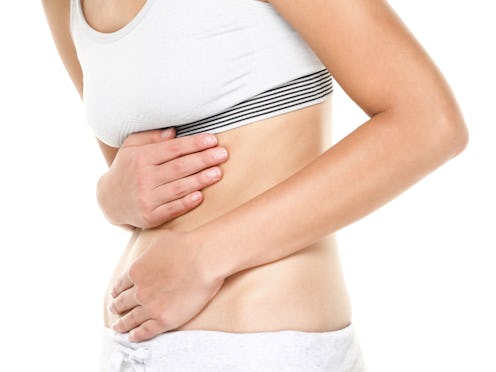Life
6 Activities That Could Help Your Stomach Issues

Digestion issues have plagued me for most of my life. I can't count the number of nights I've spent flopped on my couch, popping endless antacids, resigned to feeling bloated for three or four hours. However, over the years I've discovered that certain activities can help speed up digestion and decrease inflammation. Here are six that I've found effective, and why the experts say they work:
Yoga
How many times have you been in a yoga class and either accidentally let a little air fly or heard someone else's music in the background? If it makes you feel better, I'm raising my hand right now. Well, it turns out there's a reason for all of that noise: certain yoga poses are great for digestion. There are a few specific poses that Aspen, Colorado and Marina Del Rey, California-based yoga and meditation instructor Ashley Turner recommends. “Spinal twists (either lying down or seated) massage the abdominal area and help relieve symptoms such as gas and bloating. The bridge pose helps stretch the abdominal area and stimulate organs, and apanasana, knees hugged to the chest — you could also do one knee at a time — helps relieve gas and cramping.” So the next time you're in class, no need to feel embarrassed for sounding off. Just appreciate that your GI track is moving along.
Breathing
There are many reasons we have problems digesting our food, but often it’s a sign that the nervous system is stressed, according to Turner. Breathing exercises help to relax the central nervous system, which calms the body and aids digestion. Turner suggests using a breath control technique. “A simple, effective exercise is to practice evening and lengthening the breath. Find a comfortable position, close your eyes and become aware of breath as you match the length of inhales with the length of exhales. It is sometimes helpful to use a five count to get started, and then gradually build the number of counts for each breath.”
Working on Your Posture
Going to an all girls school when I was growing up, I heard a lot of "stand up straight, ladies," and "keep your chin tucked." I understood then that good posture projected an air of confidence, but I've since learned that it can also help break down food. When you walk with your shoulders back and chin tucked, you create more space for the digestive organs to do their job.
It turns out that your sleeping posture can impact your digestion, too. I used to sleep prone and wondered in the morning why I still felt like I had a brick in my stomach. Now I know better. Studies show that elevating the head, or adopting what is called a “bed-up” position, helps decrease the frequency of reflux or heartburn. Research also indicates that sleeping on your right side can aggravate heartburn, while resting on your left helps with digestion. (Exactly why the left side helps still isn’t clear.)
Walking
“Take a walk around the block,” my mother used to say to me after a big meal. On this point, in addition to many others, my mother seems to have been right. According to the New York Times, a study conducted in Germany in 2008 found that walking for only 15 minutes after eating can help us digest and improve our blood sugar levels. And another study in 2009 found that people with type 2 diabetes experienced lower blood sugar levels if they went for a 20-minute walk 15 minutes after eating. Just had a burrito at your desk? Take a lap — your stomach will thank you.
Massaging Your Abdomen
Health experts at the Mayo Clinic recommend massage to help with digestive disorders, especially constipation. I know, not the most pleasant topic, but it had to be addressed. To keep things moving, massage your stomach using clockwise circular strokes to help stimulate digestion. According to an article in The Nursing Times, clinicians believe abdominal massage helps constipation because it "encourage[s] rectal loading by increasing intra-abdominal pressure." As a result, "it stimulates peristalsis, decreases colonic transit time and increases the frequency of bowel movements." Did you get all of that?
Eating
You may not think of eating as an activity, but it is one of the best ways to help yourself digest food properly. Why? It has to do with the role "gut microflora" — the hordes of bacteria who live in our intestines — play in digestion.
These bacteria can either have positive or negative impacts on our digestion and overall health. "'Good' gut bacteria helps prevent constipation, gas, bloating and helps us more effectively get the nutrients from the food we consume into our bodies," says Columbus, Ohio-based dietician Ashley Harris. "'Bad' gut bacteria can cause everything from intestinal distress to activating our obesity- and disease-promoting genes."
Harris recommends eating probiotic-containing foods, such as yogurt or other fermented fare (i.e. sauerkraut, kimchi, kefir), in addition to a diet rich in fruits, vegetables, whole grains, beans, nuts, and seeds. These foods help keep the gut populated with good bacteria and ward off the bad. The bad bacteria are always present in our gut, but when we feed them processed foods, foods high in refined sugars or flours, and fast food, they are more likely to flourish and outnumber the good guys.
Image: Fotolia